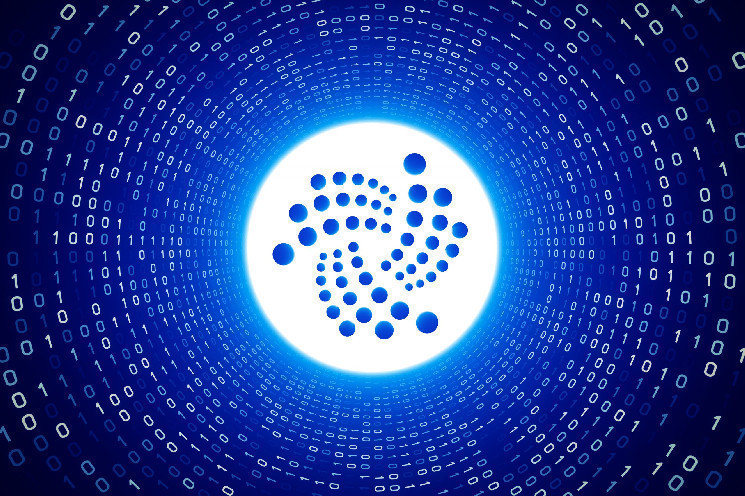Real-World Adoption: IOTA Expands Across UAE, EU, Kenya, and Germany with Enterprise EVM Compatibility

- IOTA is nearing its 10th anniversary and has achieved significant global adoption and technological development.
- The integration with Ethereum Virtual Machine (EVM) is set to boost IOTA’s DeFi ecosystem with over $30 million in liquidity.
According to a tweet by Colin Brown, a blockchain researcher, IOTA, one of the Layer 1 (L1) blockchain projects, is nearing its 10th anniversary. This milestone represents major advances in global adoption and technological development. With real-world applications spanning Kenya, the UAE, the EU, and the UK, IOTA has established a strong presence in the government and enterprise sectors.
🔥 @DomSchiener on #IOTA’s 10-year journey: Real-world adoption in Kenya, UAE, EU, & UK. EVM compatibility + $30M+ DeFi liquidity boost coming soon. One of the oldest L1s, fully audited & regulated in Germany/UAE.💪
Retweet if you still support IOTA! Never stop building! 🚀🚀🚀 pic.twitter.com/njeS3owPUM
— Collin Brown (@CollinBrownXRP) August 17, 2024
Advancing DeFi Ecosystem and EVM Compatibility
One of the key milestones that has occurred in the years since IOTA’s launch has been its integration with Ethereum Virtual Machine (EVM). This integration is expected to strengthen the project DeFi ecosystem and bring liquidity of over $30 million to the project, as highlighted by Dominik Schiener, IOTA co-founder.
The new incentives for participants and developers strengthen IOTA’s presence even more in the decentralized finance market. The project’s emphasis on innovation makes it sustainable and up-to-date with the current trends in the blockchain industry.
Additionally, IOTA’s longevity is supported by an experienced team that has successfully navigated through both bear and bull markets over nearly a decade. IOTA, as one of the first Layer 1 (L1) protocols that is still active, is a good example of the project’s growth and development.
The project is implemented under a non-profit foundation based in Germany and the UAE, which is subject to strict control and examination by independent auditors. This regulatory supervision increases IOTA’s reliability and, thus, makes it a reliable platform for users and investors.
Collaborations Enhancing the IOTA EVM Ecosystem
As IOTA commemorates its 10-year anniversary, it has grown, fueled by strategic partnerships that are driving both technological advancements and sustainability initiatives. These partnerships have proved crucial in delivering new solutions across many sectors and have further established IOTA as a key player in the market.
One of the partnerships is with Tide Protocol, which has been instrumental in the development of the IOTA ecosystem, as noted in our earlier post. The IOTA Foundation has acknowledged the protocol’s contributions, particularly in enabling the growth and achievement of the IOTA EVM.
However, there is more to IOTA than technological growth, and it is also tackling environmental concerns. As outlined in our recent blog post, IOTA recently partnered with Digimarc and Agro2Circular. This partnership enables the establishment of a Digital Product Passport (DPP) that will help counteract plastic waste in agriculture. This initiative focuses on plastic mulch films, which are a major concern for the environment.
Additionally, partnership with the European Commission under the European Blockchain Pre-Commercial Procurement to enhance IPR management solutions has been vital. This has resulted in the creation of a single, integrated, and efficient system based on Distributed Ledger Technology (DLT), Non-Fungible Tokens (NFTs), and smart contracts.
As detailed in our last news piece, Cyberperp recently launched on the IOTA EVM, which has the potential to revolutionize trading on the network. In addition, IOTA EVM recently initiated a massive liquidity program through which 172 million IOTA tokens are being given to various dApps to enhance the DeFi activity in the ecosystem.




 Bitcoin
Bitcoin  Ethereum
Ethereum  Tether
Tether  USDC
USDC  Dogecoin
Dogecoin  TRON
TRON  Cardano
Cardano  Stellar
Stellar  Chainlink
Chainlink  Hedera
Hedera  Bitcoin Cash
Bitcoin Cash  Litecoin
Litecoin  LEO Token
LEO Token  Monero
Monero  Cronos
Cronos  Dai
Dai  Ethereum Classic
Ethereum Classic  OKB
OKB  Algorand
Algorand  VeChain
VeChain  Cosmos Hub
Cosmos Hub  Gate
Gate  KuCoin
KuCoin  Stacks
Stacks  Tezos
Tezos  Theta Network
Theta Network  IOTA
IOTA  Tether Gold
Tether Gold  Zcash
Zcash  TrueUSD
TrueUSD  NEO
NEO  Polygon
Polygon  Decred
Decred  Dash
Dash  Ravencoin
Ravencoin  Qtum
Qtum  Basic Attention
Basic Attention  Zilliqa
Zilliqa  0x Protocol
0x Protocol  Synthetix Network
Synthetix Network  Holo
Holo  Siacoin
Siacoin  DigiByte
DigiByte  Enjin Coin
Enjin Coin  Ontology
Ontology  Nano
Nano  Status
Status  Hive
Hive  Waves
Waves  Lisk
Lisk  Steem
Steem  Numeraire
Numeraire  Pax Dollar
Pax Dollar  BUSD
BUSD  Huobi
Huobi  NEM
NEM  OMG Network
OMG Network  Bitcoin Gold
Bitcoin Gold  Ren
Ren  Bitcoin Diamond
Bitcoin Diamond  Augur
Augur